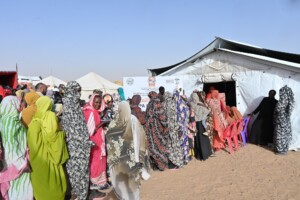FEWS NET: ‘Food security in Sudan likely to improve soon’
Average to above-average rainfall anticipated throughout October will likely to lead to favourable cropping and pasture prospects, according to Famine Early Warning Systems Network (FEWS NET).
The number of people facing Crisis-Integrated Food Security Phase Classification (IPC) Phase 3 or worse acute food insecurity levels will likely decrease significantly in the post-harvest period, the Network predicts.
Average to above-average rainfall anticipated throughout October will likely to lead to favourable cropping and pasture prospects, according to Famine Early Warning Systems Network (FEWS NET).
The number of people facing Crisis-Integrated Food Security Phase Classification (IPC) Phase 3 or worse acute food insecurity levels will likely decrease significantly in the post-harvest period, the Network predicts.
Such levels of food insecurity mainly affect conflict-affected people and displaced people in South Kordofan, Blue Nile, and Darfur, the UN Office for the Coordination of Humanitarian Affairs reported in its latest weekly bulletin.
Heavy rains and flooding since June have damaged infrastructure and houses, destroyed crops, and delayed planting and weeding in localised areas throughout the country. More than 204,000 people have been directly affected and over 74,000 hectares of crops destroyed by floods, according to the Sudanese government and partners. States worst affected are El Gedaref, Kassala, and Sennar in eastern Sudan, El Gezira and White Nile in central Sudan, South and West Kordofan, and North and South Darfur in the west.
According to FEWS NET, staple food prices showed mixed trends for the different markets between July and August. In El Gedaref, the main region supplying markets, sorghum prices decreased by 10 per cent between July and August as traders and commercial farmers began to sell off old stocks. Sorghum and millet prices in August were 24 to 32 percent higher than in August 2015, and 50 to 57 percent higher than the recent five-year average.
Staple food prices are likely to begin declining seasonally in most markets with the onset of harvests in October and November, according to FEWS NET.
Lack of rains
However, farmers from Central, West, South, and North Darfur told Radio Dabanga early this month that after heavy rains caused flash floods across Darfur in July, there has been little rainfall since early August.
They expressed concern at the failure of the current agricultural season, as their ripening crops -especially millet, sorghum, groundnuts, and sesame- withered because of the lack of rains.











 and then
and then